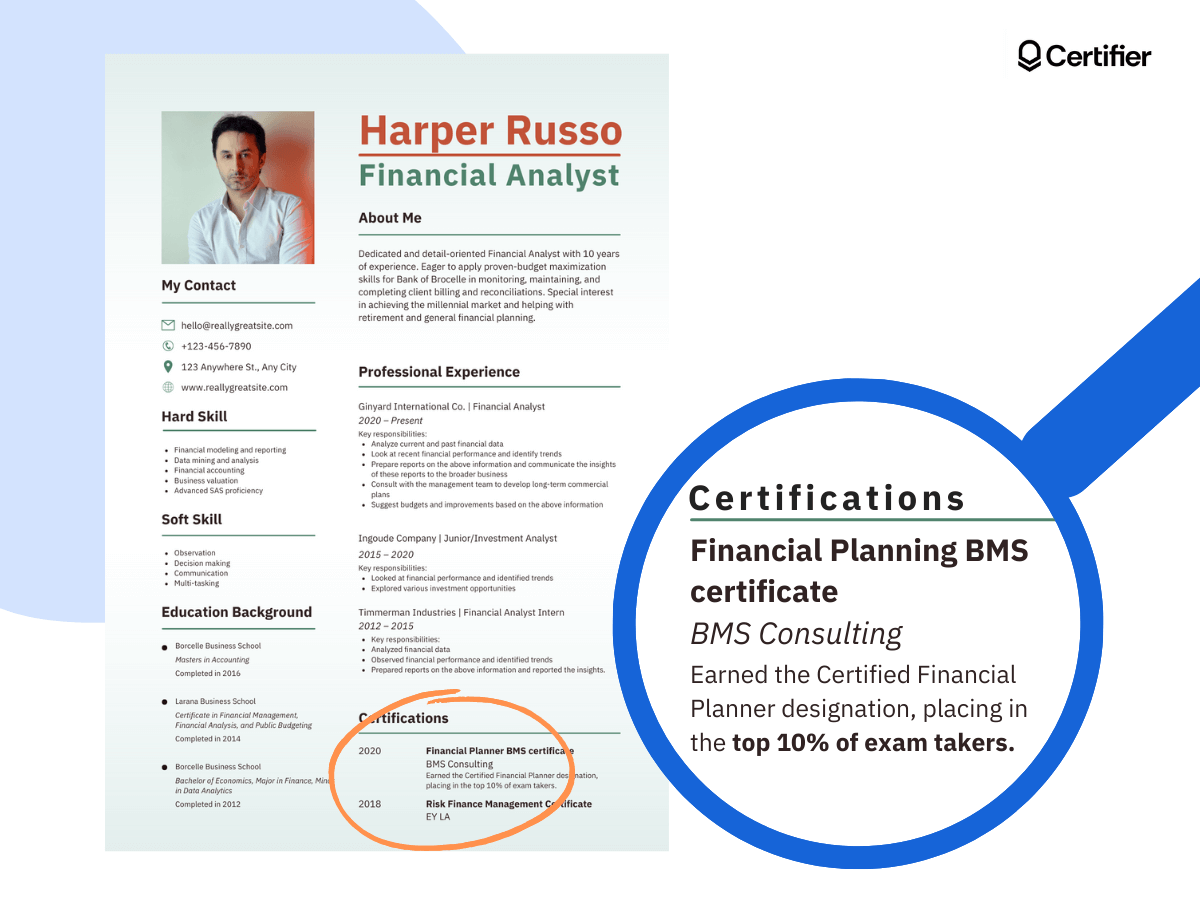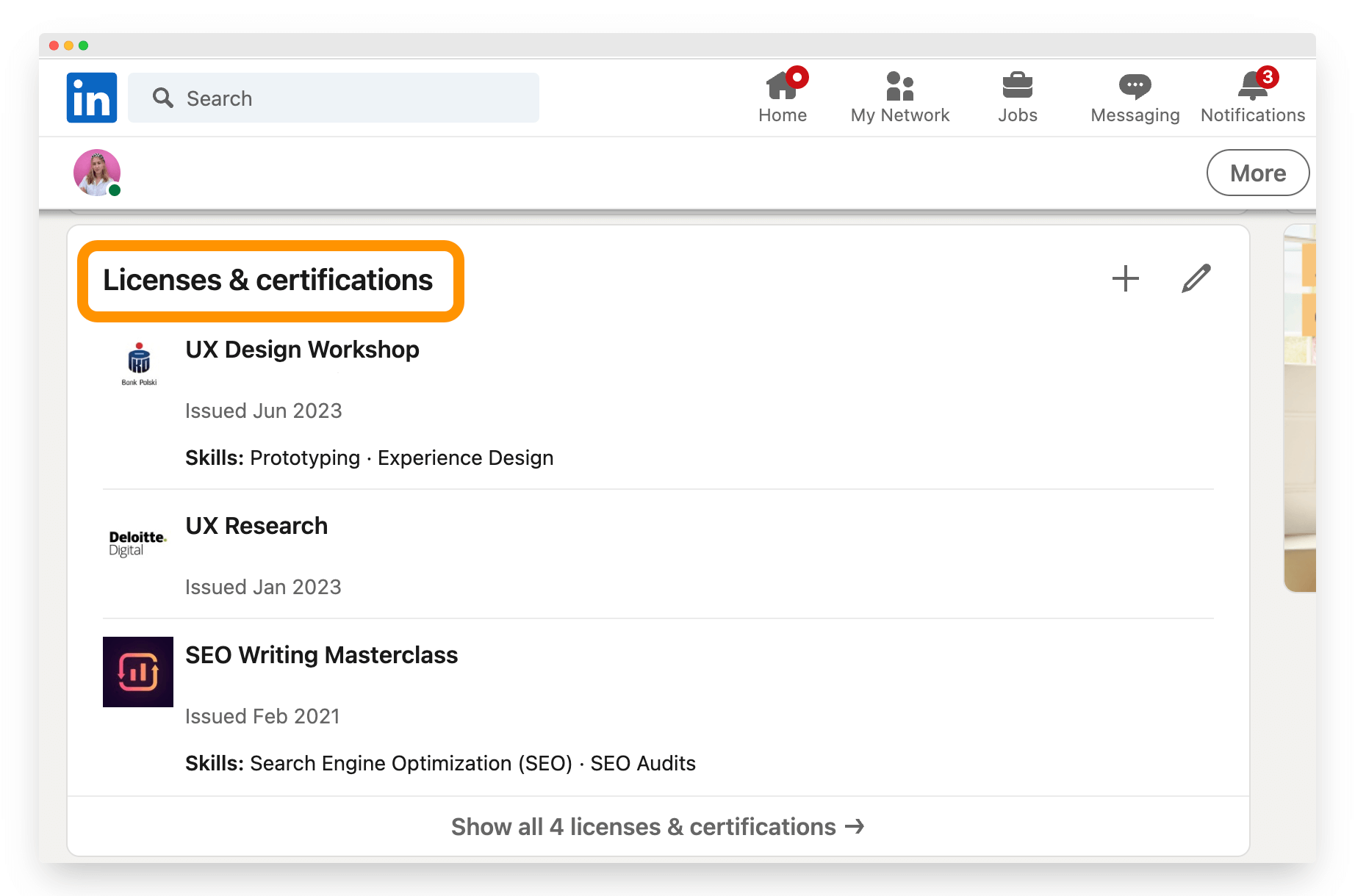Trusted by:
Make Your CV Stand Out: How to List Certifications on Resume?
Did someone say certificates? Certifier is always ready to assist! Increase your chances of getting a job and list certifications on your resume. How, where, and what to remember about. All in this guide!
AuthorSergey Butko
Updated: August 29, 2023
13 min read

Author
Sergey Butko
Updated: August 29, 2023
13 min read
Trusted by:
If you are pursuing your dream job, certificates on resume can be the irresistible cherry on top that makes your CV shine. How can you make them work and set you apart from other job applicants? There are some things you should know.
We’ll show you:
When you should include a certification on your resume
The best places to put your certification on a resume
The most common mistakes when listing resume certification
Is it a good idea to include certificates on a resume?
Let's cut to the chase. Yes, certificates are a great way to add value to a resume.
Certificates prove your skills and knowledge, giving you an edge over other candidates. It shows that you've invested time and effort in improving your skills.
Think of them as flashy badges of honor that scream – "I'm the one!".
➡️ Do you need to design free certifications on resume to add extra value to your achievements? Choose from hundreds of ready-made templates. Join Certifier today (for free!).
The 3 criteria to check to determine if your certification is worthy of going on a resume
While you want to showcase your qualifications, you don't want to overwhelm hiring managers with too much information. So, check off these boxes before you put the certification among your achievements.
Here are three criteria to consider when deciding if a certification is worthy of a spot on your perfect resume.
#1 Relevance
Not all that glitters is gold. The same goes for certificates. If it's not relevant to the job you're applying for, it's just taking up valuable space on your resume. So, before you list a certificate, ask yourself: "Is it a job-critical certification that makes me a better candidate for this job?"
#2 Certification authority
Who gave you the certificate matters. Don't ignore it if it's from a well-respected institution or organization. But if it's from an unknown source – it might raise more eyebrows than interest.
#3 Importance at present
The relevant topics five years ago might not be relevant today (especially in career fields such as technology and healthcare). It’s crucial to consider the current relevance of your certification. It might be best to leave it off your resume if it's outdated or no longer recognized in your industry.
Tip! A resume is a snapshot of your professional life. So, if you're running out of space, it's time to play favorites. Get rid of the certificates that don't offer much and keep the ones that do.
How to list certifications on a resume to make them look professional?
Listing professional certifications on a resume can be a powerful way to improve your chances of becoming valuable hire. But only if done right. The key lies in positioning them strategically so they won't get lost in your career summary. More so if there are multiple certificates to include.
Let's see how certifications should be included on a resume to get the attention they deserve.
In a short bio summary
Your bio is the first thing recruiters see. And it's the perfect place to drop a hint about your certifications. This way, you've set the stage for your expertise right at the start (and make recruiters want to read more!).
For example, you could write, "John Doe, a Certified Web Developer Professional with over eight years of practical experience in the IT industry."

Note: Human resources professionals increasingly use applicant tracking systems (ATS). These systems scan your resume, recognizing you as a candidate with the necessary qualifications. It is best to place your critical certifications in your resume summary to prevent them from being missed by detectors.
In a separate section
Sometimes, it's good to let your essential certifications have their place on your resume. A separate section dedicated to certifications can make them stand out and be easy to spot. This approach works particularly well if you have multiple relevant certifications to mention.
For instance, you could have a section titled "Certifications," where you list each dedicated certification one by one. Add such information as:
certification full name
issuing authority
date of certification
expiration date (if necessary)
With a separate certification section and more space to use, you can include special certification details, such as "Achieved the Certified Financial Planner designation, placing in the top 10% of exam takers."

List your achievements and certifications in reverse-chronological order. This way, the recruiter sees your most recent and relevant accomplishments first.
Tip! Do you still need to gain professional experience? You can place the certificate in your "Achievements" section, among other accomplishments.

Next to your name
Some key certifications are widely recognized in the industry. Then, you can also list those popular certification titles next to your name at the top of your resume.

As a result, the recruiter is immediately aware of your expertise. For example, "Alex Johnson, MBA" clearly communicates that they are a certified Master of Business Administration.”
In a cover letter
Your cover letter is your sales pitch. And your certifications are your unique selling points. Mention them in your cover letter to convince recruiters that you're the best candidate for the job.
Even so – it's a complementary option that shouldn't be relied on alone. There is a high chance that among hundreds of job applications that arrive at the recruiters' inboxes, cover letters are just scanned.
Tip! Numbers in headlines generate more sales. Certificates are no different. Use numbers. They have a unique power to grab peoples’ attention. Using numbers, you transform vague statements like "improved sales" into "increased sales by 35% within the first quarter." It adds credibility to your claims and showcases your ability to make a measurable impact.
Common mistakes when listing a certificate on resume
Here are job seekers' most common mistakes when listing certifications on their CVs. Avoid them to keep your resume flawless.
Irrelevant certificates
Listing irrelevant certifications is like bringing a knife to a gunfight. It's not going to help you win. Stick to the credentials that matter for the job.
Including certifications that don't pertain to the job you're applying for can confuse hiring managers and clutter your resume.
To avoid making this error, follow these steps:
Review the job description and understand what skills and qualifications the prospective employer is seeking
Evaluate your certifications and determine which ones are most relevant to the job
Prioritize only job-critical resume certifications that will strengthen your application for this specific role
Tip! Customize your professional resume for each job application. It takes extra effort and time, but trust us – it's worth it. Avoid sending out generic resumes.
Incomplete information about certifications
Providing half-baked information about your certifications can leave hiring managers with more questions than answers.
To paint a complete picture:
The full name of the certification should be clearly stated
Mention the issuing organization as the entity that granted the certificate adds credibility
State when did you receive the certificate, or if they're ongoing certifications, the date when they expire
Highlight additional skills and list the key competencies you gained through this certification
Add extra certifications on LinkedIn so that recruiters can see more details about your credentials there and see the ones that were not so vital for the offer

➡️ For more information on how to update your LinkedIn account as well (career advice: it is crucial during the job-seeking process), see this: How to Add Certifications to LinkedIn and Spice up Your Profile
Invalid certifications
You may be tempted to add all your certificates to your resume. But they have an expiration date for a reason. Certifications that are outdated are like expired coupons. They're no longer helpful. Your resume should be separate from optional certifications.
Regularly review news and updates to understand what industry certifications are most valued
Consider recertification or pursuing new business certifications to keep your skills fresh
If a certification is outdated or no longer recognized in your industry, remove it from your resume
Wrong format
Presenting relevant certificates in an inconsistent or hard-to-read format can make your resume look unprofessional.
So, to maintain a clean, professional look:
Be consistent and use the same format for each certification you list
Avoid jargon or acronyms that might not be understood by everyone
While it's essential to include key details, also strive for clarity to keep your resume accessible to read
When creating digital resumes, consider adding a link to your certificates, as it adds an extra layer of credibility to your qualifications. However, here you have to use the appropriate format as well!
Link it to a PDF document for easy access and professional presentation. Potential employers can quickly validate your certifications, boosting your chances of standing out as a reliable and well-qualified candidate.
Get professional certificates for your resume with Certifier
This is all you need to know about how to put your certifications on resume and strategically showcase your credentials. Keep them in mind when preparing your curriculum, and you'll increase your chances of landing that dream job!
Remember – if you want to catch the attention of a recruiter (and for sure you want!), certifications are your secret weapon.
Want to raise your career profile? Check out Certifier. It's a one-stop shop for all your certification needs. It's not just a certificate maker. It's a comprehensive solution for digital certification.
So, whether you're a student, an employee, or a job seeker, Certifier can help you boost your resume with certifications and get noticed. Take action today and sign up.
FAQs: Certifications on a resume
Listed below are the most frequently asked questions about listing your certifications on a resume.
Should I include expired certifications on my resume?
Including expired certifications on your resume is generally not recommended. While these certifications might have been relevant and valuable in the past, they may no longer hold the same weight or significance.
Which certifications should I list on my resume?
List certifications that are relevant to the job you are applying for. Identify the target job requirements and prioritize certifications that align with relevant skills and qualifications. Prioritize certificates issued by vital organizations as well.
What information should I include about each certification?
For each certification, include its full name, issuing authority or organization, certification date, and expiration date (if applicable). You may also add the credential ID or license number if relevant.
Should I differentiate certifications from degrees and courses?
Yes, it's vital to distinguish certifications from degrees and courses. Clearly label each section to avoid confusion and showcase your education and certifications separately.
Can I include training programs and workshops as certifications?
While training courses and workshops can be valuable additions, they are not formal certification programs. You may include them in a separate section or under "Professional Development."

Sergey Butko
Tech entrepreneur. Forbes 30 Under 30 Europe. At Certifier, Sergey’s work focused on revolutionizing the way credentials, certificates, and badges are issued and managed through cutting-edge APIs and software infrastructure.
Sergey Butko
Tech entrepreneur. Forbes 30 Under 30 Europe. At Certifier, Sergey’s work focused on revolutionizing the way credentials, certificates, and badges are issued and managed through cutting-edge APIs and software infrastructure.
Share this article